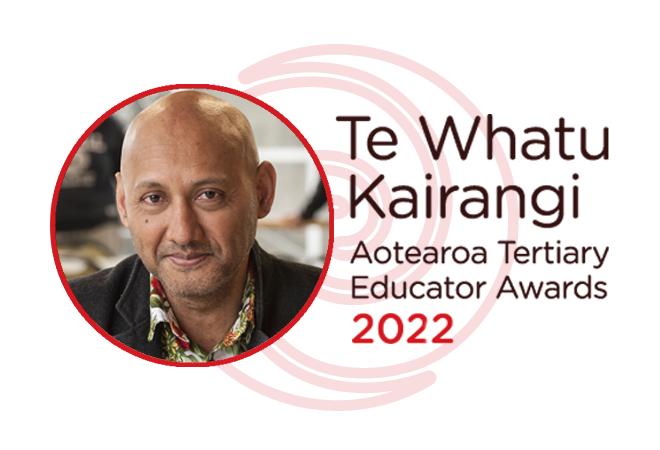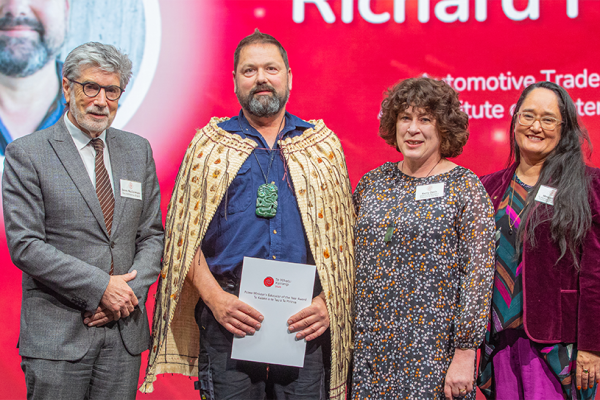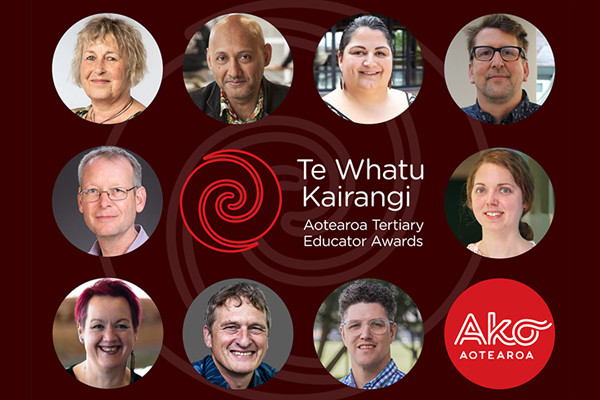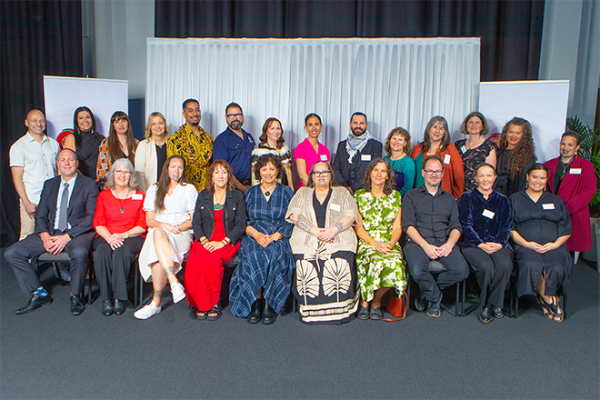Patrick Vakaoti
Humility at the heart of fostering student relationships
Category winner | Achieving diversity and inclusion for improving outcomes for: Māori learners; Pacific learners; neurodiverse learners; and/or learners with disabilities
Associate Professor, Sociology | Te Whare Wānanga o Otago | University of Otago
Watch Patrick Vakaoti's Teaching profile video
“Universities are places of hope and enlightenment for learners and teaching is a way of realising this. I draw on my identity as a Fijian and Pacific lecturer, my leadership position as inaugural Associate Dean (Pacific) in the Division of Humanities (2017-2021) and successful student, staff, and community relationships and initiatives to accomplish this aspiration.”
Patrick grew up and attended school on the island of Ovalau, in Fiji. He enjoyed learning but did not know universities existed until his name appeared alongside others in the Fiji Times as new entrants to the University of the South Pacific (USP). His careers teacher had submitted a USP application without his knowledge. Patrick was the first in his immediate and extended family to attend university. While learning at USP was more of an independent endeavour, the learning community was diverse, as USP educated students from the twelve member countries of the Pacific that own the institution. Patrick learnt about the Pacific and the rest of the world, and was fortunate to be taught by eminent Pacific lecturers. He saw himself reflected in their Pacific identities and benefitted from their ability to teach diverse student populations. Patrick’s inspiration to teach also comes from his mother who was a primary school teacher. As an indigenous Fijian woman, her teaching both at home and in school was influenced by the Fijian values of veiwekani (knowing and forming relationships), vei talanoa (conversing respectfully with people) and vei rogorogoci (listening with respect and intently to others). Her values became his values, and he now draws on them to bring hope and enlightenment to his students. He places students at the centre of the learning context, works towards challenging and removing barriers to learning, and fosters an environment for quality teaching and leadership.
The main context for Patrick’s teaching is the field of Sociology, which studies human relations and social issues such as poverty, inequality, and crime. As Sociology often uses complex ideas that students find intimidating and counterintuitive, Patrick demystifies these for his students, making them more accessible. He sees Sociology as based on the idea that the world is not black and white – that there are many realities and Māori, Pacific, and other indigenous world views are just as valuable as other knowledge systems. He uses Sociology as a manual or map to navigate the hybrid world in which he lives and applies this in his interactions with students, teaching them about the intriguing nature of the world, how it is constructed, and how it influences people. As most of his students are young, he encourages them to reflect on these realities as part of their learning, such as discussing how the definition of youth varies across cultures.
Patrick fosters effective learning with a diverse range of students by establishing a welcoming environment that encourages veiwekani or relationships. Veiwekani facilitates connectedness and is practised with much humility and patience, providing the basis for a safe learning environment. As a teacher, he makes veiwekani come to life by engaging students in two practices at the beginning of each class. He asks students to greet each other with a smile, handshake, or hello, and introduces a reflective question which students ‘pair, discuss, and share’. These practices create a classroom environment of conversation.
“Humility lies at the heart of my relationship with students allowing me to make room for student opinion. This creates a special learning environment where students are comfortable, trusting, and feel safe to engage.”
As well as creating a safe learning environment, Patrick gets to know his students. His class sizes may range from 10 to 150, but he asks all students in each first class to complete a student profile, encouraging them to say how their learning could best be supported. He pairs his students’ profile photos with their written profiles to help him learn all their names and, when providing written feedback on assessments, greets them in their first or ethnic language. During the semester, he revisits the profiles to ensure he is responding to student needs through his content, interactions, and assessments. Patrick fosters reflexivity through conversations around content and assessments that enhance critical thinking. He is skilled at listening, empathising, and having honest conversations. Also, he keeps his assessments relevant, such as introducing a 1500-word autobiographical essay where students write about being young in Aotearoa.
Patrick’s appointment as Associate Dean (Pacific) in the Division of Humanities allowed him to provide strategic guidance and support for Pacific research and teaching, drawing on his expertise in, and passion for, supporting Pacific learners. His work was acknowledged in 2021 by the 2021 UOPISA ‘Pacific Academic Staff Award’. In 2021, he supported the Theology Programme in developing CHTH337: Moana Pasifika Theology, the first Pacific paper in Theology at Otago and, in 2014, he developed and delivered the first and only Pacific specific paper in the Social Work programme. Patrick actively leads and influences the development of Pacific consciousness amongst non-Pacific staff. In 2018, he won a grant to explore how non-Pacific staff can better support Pacific students at Otago, resulting in the workshop Engaging with and supporting Pacific Islands students to succeed at the University. This involves a kava circle introducing participants to a Pacific worldview and a student-led session where students share the realities and experiences of being a Pacific student. Patrick teaches into other programmes like Pacific Studies, Pacific and Global Health and Medicine. His longest collaborative engagement is with the Social Work programme where for the past decade he has taught a module on Pacific social work with third year (Bachelors) and Masters social work students. These classes are diverse, with students coming from a range of demographic and professional backgrounds.
Patrick works alongside Pacific students to ensure that the University is their ‘home’. In 2018, he contributed to the development of the six-week summer school paper Pacific Realities and University Learning (Kickstart 101) which enrols around 25 students per year. It is designed to prepare Pacific students for university studies and involves lectures, workshops, and social activities. Patrick finds at university his Fijian-influenced pedagogy, as with Te Ao Māori and other indigenous approaches, is dwarfed by Western mainstream approaches. He aims to sustain indigenous-informed teaching practices by institutionalising them via the strategies and policies of the institution and incorporates this in his teaching practice. He has advocated for the recognition and treatment of cultural artefacts and resources as learning tools, as well as designing and facilitating workshops for staff to better support Pacific students’ success at the University. He has also introduced the practices of talanoa and kava circle to residents of Salmond College in order to make the College more culturally supportive.
“To me teaching is not a job, it is a vocation.”



